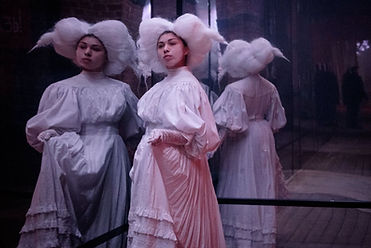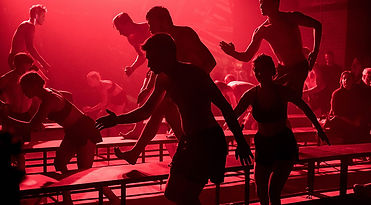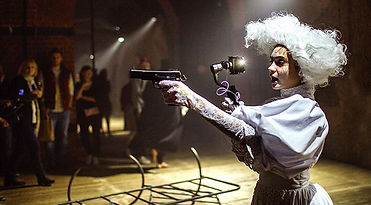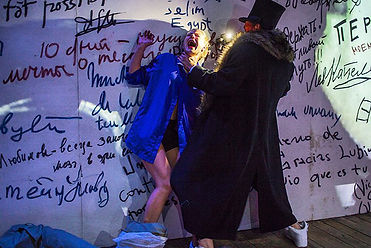10 DAYS THAT SHOOK THE WORLD

10 DAYS THAT SHOOK THE WORLD
PRAKTIKA THEATRE
MOSCOW, RUSSIA
Duration 2 hours
Director Maxim Didenko
Premier took place on 29 September 2017
Creative Group
Idea Katalin Lyubimova
Playwright Konstantin Fedorov
Composer, choirmaster Alexander Karpov
Space Alexey Tregubov
Costume designer Maria Tregubova
Choreographer Irina Galushkina
Video artists Ilya Starilov, Oleg Mikhailov
Lighting designer Ivan Vinogradov
Technical Director Kirill Nosyrev
Assistant Technical Director Nikita Korovin
Console operator Alexander Krasnolutsky
Sound engineers Dmitry Wolfram, Oleg Grachev
Video engineer Dmitry Egorov
Director's assistants Tamara Shishlova, Emilia Kivelevich
Artist's assistant Valeria Turetskaya
Propsman Daria Ufimtsev
Make-up artists Svetlana Kozyrchikova, Ksenia Turchaninova Costumers Anna Barbacaroo, Alexandra Sopolnova
Producer Assistant Natalia Rodionova
General Producer Svetlana Dolya
CAST
Masterskaya D. Brusnikin
In 1965, Yuri Lyubimov staged the play “10 Days that Shook the World” at the Taganka Theater. He was destined to become legendary. The director himself designated the genre of the play as “a folk performance in 2 parts with pantomime, a circus-buffoonery and shooting based on the book by John Reed.”
In 2017, Maxim Didenko staged a play of the same name at the Museum of Moscow as part of an exhibition about the great director. This is not a reconstruction of the performance. This is a rethinking of the material, a topic that is even more relevant now, a hundred years after the events described by John Reed.
"A play, film, exhibition, piece of music or book about a revolution can be terrifying, pretentious, or neutral. But it is a rare artist who will present, along with historical correctness, a human body that is not mutilated, but multiplied by the myth of the revolution, embodied after the fact in almost ancient statues and bas-reliefs with male discus throwers and female Venus. In the performance by Maxim Didenko and Dmitry Brusnikin's Workshop, the image of a rioting crowd eventually turned into a sculptural ensemble of hot, half-naked bodies. The power of the moment, of course, saves the performance from what Bakhtin calls “the impact on the material and bodily lower parts,” but it is impossible to take your eyes off."
Afisha








